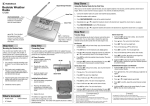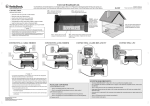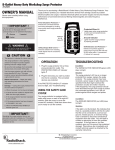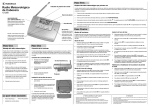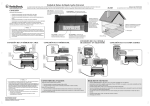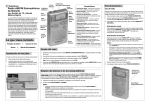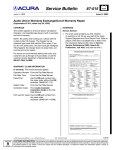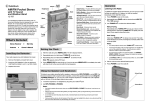Download Radio Shack Portable Cassette Recorder Specifications
Transcript
EAR — Connect the supplied earphone here for private listening. Portable Cassette Tape Recorder 14-1117 A Cassette tape compartment DC 6V — Connect an adapter and use AC or DC power. AUX — Connect an external audio source so that you can record from it. Step One Powering the Recorder REM — Connect an external microphone here if the microphone has remote control capability. Installing Batteries 1. Press down on the battery compartment cover and slide it in the direction of the arrows to remove it. MIC — Connect an external microphone, if desired. MIN-VOLUME-MAX — Adjust playback volume to the desired listening level. Step Two 2. Insert four size C batteries as indicated by the polarity symbols marked inside. 3. Replace the cover. Using AC or DC Power You can power the recorder using a 6V, 300mA AC adapter or a 12V power source (such as your vehicle’s cigarette-lighter socket), and a size M Adaptaplug™ adapter (none supplied). Both are available at your local RadioShack store. Caution: You must use a Class 2 power source that supplies 6V DC and delivers 300mA. Its center tip must be set to negative and its plug must fit the recorder's DC 6V jack. Using an adapter that does not meet these specifications could damage the recorder or the adapter. ! 1. Set the adapter’s voltage switch to 6V. 2. Attach the Adaptaplug to the adapter’s cord with the tip set to negative. Connecting Earphones Use the supplied earphone for private listening. Insert the earphone’s plug into the recorder’s EAR jack. Connecting the earphone automatically disconnects the built-in speaker. Listening Safely • Set the volume to the lowest setting before you begin listening. After you begin listening, adjust the volume to a comfortable level. • Do not listen at extremely high volume levels. Extended high-volume listening can lead to permanent hearing loss. • Once you set the volume, do not increase it. Over time, your ears adapt to the volume level, so a volume level that does not cause discomfort might still damage your hearing. Traffic Safety • Do not wear earphones while operating a motor vehicle or riding a bicycle. This can create a traffic hazard and could be illegal in some areas. • Even though some earphones let you hear some outside sounds when listening at normal volume levels, they still can present a traffic hazard. Ô BATTERY NOTES Ô • Dispose of old batteries promptly and properly. 3. Insert the adapter’s barrel plug into the recorder’s DC 6V jack. This disconnects the batteries. • Do not burn or bury batteries. • Use fresh batteries of the required size and recommended type. • Do not mix old and new batteries, different types of batteries (standard, alkaline, or rechargeable), or rechargeable batteries of different capacities. 4. Plug the other end of the adapter into a standard AC outlet or a DC power source. • If you do not plan to use the recorder for a month or more, remove the batteries. Batteries can leak chemicals that can damage electronic parts. Step Three Step Four Loading a Cassette Playing a Cassette 1. Remove any slack from the cassette tape by turning one of the hubs with a pencil. The tape might become tangled in the record/playback mechanism if you do not remove excess slack. 1. Load a cassette tape in the compartment. 2. Rotate VOLUME to MIN for low sound. 3. Press PLAY. The tape begins to play. 2. Press STOP/EJECT to open the cassette compartment door. 4. Adjust VOLUME to the desired listening level. 3. Insert the tape with its open edge outward toward the controls, and the desired side facing up. 5. To stop playback before the tape reaches the end, press STOP/EJECT. Otherwise, the tape will automatically stop playing once it reaches the end. 4. Close the door. 6. Press STOP/EJECT again to open the cassette compartment door and remove the cassette. Step Five Recording 1. Load a cassette tape in the compartment. Using the Built-In Microphone 1. Load a cassette tape in the compartment. 2. Connect an external microphone. 2. Place the recorder as close as possible to the recording source (within 2-3 feet, if possible). 3. Press RECORD. Both PLAY and RECORD automatically remain pressed down, and the RECORD/BATT LED lights while recording. If the external microphone has a 1/8-inch plug, insert it into the recorder’s MIC jack. If the external microphone has two plugs and an On/Off switch, this means you can remotely control the recorder from your microphone. Insert the microphone’s 1/8-inch plug into the recorder’s MIC jack, and the smaller plug into the REM jack. 4. Press PAUSE at any time to temporarily stop recording. To 3. Press RECORD. Both PLAY and RECORD automatically resume recording, press PAUSE again. remain pressed down. 5. Press STOP/EJECT to stop recording. 4. If you are using an external microphone with an On/Off switch, set the switch to ON. Using an External Microphone You can connect an external 1/8-inch plug to the recorder. 5. Speak into the microphone. Depending on the type of microphone you use, this is handy when you want to record only an individual’s voice or exclude 6. Press STOP/EJECT to stop recording. other sounds in the surrounding area. Your local Radioshack store carries a wide variety of microphones. Step Six Notes Tape Cleaning Care Recording from an External Audio Source • Connecting an adapter disconnects the internal batteries. • To see if batteries need to be replaced, press PLAY, REWIND, or FAST-F. If the RECORD/BATT LED lights steadily, replace the batteries. Keep the recorder dry; if it gets wet, wipe it dry immediately. Use and store the recorder only in room temperature environments. Handle the recorder carefully; do not drop it. Keep the recorder away from dust and dirt, and wipe it with a damp cloth occasionally to keep it looking new. • Press PAUSE at any time to stop tape playback. To resume playback, press PAUSE again. Dirt, dust, or particles can accumulate on the tape heads and other parts that the tape touches. This can greatly reduce the performance of the cassette player. After every 20 hours of tape player operation, clean the tape parts or use a RadioShack cassette deck cleaning kit. 1. Before connecting an external audio source to the recorder, make sure volume on the source and recorder are set to minimum. • Press REWIND or FAST-F to rapidly wind the tape backward or forward. To resume play, press STOP/EJECT, and then press PLAY. 1. Remove the batteries and disconnect any other power source. • Before loading a cassette tape for recording, be sure the cassette’s erase-protection tabs are in place. 2. Open the cassette compartment door and press PLAY to expose the tape parts. 2. Load a cassette tape in the compartment. • The recorder’s Automatic Level Control circuit automatically adjusts the recording level. VOLUME has no effect on recording. You can record directly from an external audio source, such as a radio, tape deck, or CD player, using a suitable mono patch cord with a 1/8-inch plug (available at RadioShack). 3. If you connected an external microphone, disconnect it. • Connecting an external microphone automatically disconnects the built-in microphone. 4. Connect one end of your patch cord to your external audio source, and then connect the other end to the AUX jack. • To temporarily stop recording, press PAUSE, or set the microphone to OFF. To resume recording, press PAUSE again or set the microphone to ON. • 5. Turn on the audio source and adjust its volume to a comfortable listening level. During recording, the recorder’s speaker is muted. If you want to monitor recording, use the supplied earphone. 3. Use a cotton swab dipped in denatured alcohol or tape head cleaning solution to clean the tape guides, record/play head, erase head, pinch roller, and capstan. 4. When you are finished, press STOP/EJECT and close the cassette compartment door. Then reconnect power. 6. Press RECORD to begin recording. Both PLAY and RECORD automatically remain pressed down while recording. 7. Press STOP/EJECT to stop recording. Most material on compact discs and prerecorded tapes is copyrighted. Unauthorized duplication of copyrighted material is a violation of the copyright laws of most countries and such duplication may result in fines and/or imprisonment. Please note that in the United States, it is not a violation of the U.S. copyright laws for a consumer to use an audio recording device to duplicate musical recordings for noncommercial (personal) use. Tape Tips Recommended Tapes Restoring Tension and Sound Quality Tape quality greatly affects the quality of the recording. We recommend extended-range or low noise Type 1 regular length (60 or 90 minute) normal-bias cassette tapes. We do not recommend long-play cassette tapes such as C-120s because they are thin and easily tangle. After playing a cassette tape several times, the tape might become tightly wound on the reels, causing playback sound quality to deteriorate. To restore the sound quality, fast-forward the tape from the beginning to the end of one side, then completely rewind it. Loosen the tape reels by gently tapping each edge of the cassette on a flat surface. Be careful not to damage the cassette when tapping it. Do not touch the exposed tape or allow any sharp objects near the cassette. Preventing Accidental Erasure Erasing Recordings To record over a cassette tape, simply record as usual. The cassette deck records over the previous recording. Erase-Protection Tabs What’s Included • Tape Recorder with Cassette Player • Earphone • Built-in Microphone • Erasing Plug • Owner’s Manual Cassette tapes have two erase-protection tabs — one for each side. When a tab is in place, you can record on that side. To prevent erasure of a recording, use a screwdriver to remove one or both of the erase-protection tabs. This prevents RECORD from being pressed. If you later decide to record on a side after you have removed the erase-protection tab, place a piece of strong plastic tape over that side’s erase-protection hole. Cover only the hole originally covered by the erase-protection tab. Removing the erase-protection tabs does not prevent a bulk eraser from erasing a cassette tape. To erase a cassette tape, insert the supplied erasing plug into the MIC jack and press RECORD. The recorder records silence until the tape reaches the end or you press STOP/EJECT. To avoid accidentally recording sound, be sure to disconnect any external audio source from the recorder’s AUX jack while using the erasing plug. If your recorder is not performing as it should, take it to your local RadioShack store for assistance. To locate your nearest RadioShack, use the store locator feature on RadioShack's website (www.radioshack.com), or call 1-800-The Shack (843-7422) and follow the menu options. Modifying or tampering with the recorder's internal components can cause a malfunction and might invalidate its warranty. Specifications Cassette Player Track System ............................................................. 2-Track Monaural Tape Speed ......................................................................... 4.76 cm/sec Recording System .......................................... Magnetic Erase, AC Bias Frequency Response ........................................... 125 to 6.3 kHZ ±6 dB Signal to Noise Ratio ..................................................................... 55 dB Wow and Flutter .......................................................................... 0.20% General Power Requirements .................................. DC 6V, Four (4) C Batteries, AC Adapter, DC Adapter 3 Dimensions (HWD) ..................................... 1 /4 x 5 11/16 x 9 5/8 Inches 45 x 145 x 245 mm Weight (without batteries) ......................................... 1 lb 12 oz. (794 g) Limited 90-Day Warranty This product is warranted by RadioShack against manufacturing defects in material and workmanship under normal use for nintey (90) days from the date of purchase from RadioShack company-owned stores and authorized RadioShack franchisees and dealers. EXCEPT AS PROVIDED HEREIN, RadioShack MAKES NO EXPRESS WARRANTIES AND ANY IMPLIED WARRANTIES, INCLUDING THOSE OF MERCHANTABILITY AND FITNESS FOR A PARTICULAR PURPOSE, ARE LIMITED IN DURATION TO THE DURATION OF THE WRITTEN LIMITED WARRANTIES CONTAINED HEREIN. EXCEPT AS PROVIDED HEREIN, RadioShack SHALL HAVE NO LIABILITY OR RESPONSIBILITY TO CUSTOMER OR ANY OTHER PERSON OR ENTITY WITH RESPECT TO ANY LIABILITY, LOSS OR DAMAGE CAUSED DIRECTLY OR INDIRECTLY BY USE OR PERFORMANCE OF THE PRODUCT OR ARISING OUT OF ANY BREACH OF THIS WARRANTY, INCLUDING, BUT NOT LIMITED TO, ANY DAMAGES RESULTING FROM INCONVENIENCE, LOSS OF TIME, DATA, PROPERTY, REVENUE, OR PROFIT OR ANY INDIRECT, SPECIAL, INCIDENTAL, OR CONSEQUENTIAL DAMAGES, EVEN IF RadioShack HAS BEEN ADVISED OF THE POSSIBILITY OF SUCH DAMAGES. Some states do not allow limitations on how long an implied warranty lasts or the exclusion or limitation of incidental or consequential damages, so the above limitations or exclusions may not apply to you. In the event of a product defect during the warranty period, take the product and the RadioShack sales receipt as proof of purchase date to any RadioShack store. RadioShack will, at its option, unless otherwise provided by law: (a) correct the defect by product repair without charge for parts and labor; (b) replace the product with one of the same or similar design; or (c) refund the purchase price. All replaced parts and products, and products on which a refund is made, become the property of RadioShack. New or reconditioned parts and products may be used in the performance of warranty service. Repaired or replaced parts and products are warranted for the remainder of the original warranty period. You will be charged for repair or replacement of the product made after the expiration of the warranty period. This warranty does not cover: (a) damage or failure caused by or attributable to acts of God, abuse, accident, misuse, improper or abnormal usage, failure to follow instructions, improper installation or maintenance, alteration, lightning or other incidence of excess voltage or current; (b) any repairs other than those provided by a RadioShack Authorized Service Facility; (c) consumables such as fuses or batteries; (d) cosmetic damage; (e) transportation, shipping or insurance costs; or (f) costs of product removal, installation, set-up service adjustment or reinstallation. This warranty gives you specific legal rights, and you may also have other rights which vary from state to state RadioShack Customer Relations, 200 Taylor Street, 6th Floor, Fort Worth, TX 76102 12/99 ©2003 RadioShack CorporationAll Rights Reserved. RadioShack and RadioShack.com are trademarks used by RadioShack Corporation. 14-1117 A Printed in China 08A03



